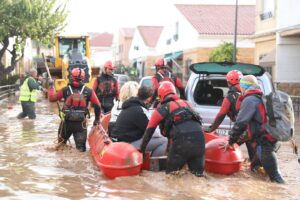Physical Address
23,24,25 & 26, 2nd Floor, Software Technology Park India, Opp: Garware Stadium,MIDC, Chikalthana, Aurangabad, Maharashtra – 431001 India
Physical Address
23,24,25 & 26, 2nd Floor, Software Technology Park India, Opp: Garware Stadium,MIDC, Chikalthana, Aurangabad, Maharashtra – 431001 India

Spain faces an unprecedented humanitarian crisis as catastrophic floods wreak havoc nationwide, fueled by record-breaking rainfall. In hours, communities were submerged under an astonishing amount of water—equivalent to more than a year’s worth of rains—particularly devastating the eastern coast, including Valencia. Streets transformed into raging rivers, sweeping away vehicles and forcing thousands of residents to flee their homes. In response to this natural disaster, the Spanish government has declared a state of emergency, mobilising emergency services to assist those trapped and distribute vital supplies. With the nation in mourning for over 150 lives lost and many more affected, the struggle to recover from this devastating event has only just begun.
Unprecedented Rainfall Causes Devastation Across Spain
Spain is reeling from historic rainfall that has left communities struggling to recover. More than a year’s worth of rain fell in just hours, primarily impacting Valencia and other parts of the eastern coast. Torrential rains turned roads into rivers, swept away vehicles, and forced thousands of residents from their homes. In response, the Spanish government declared a state of emergency, mobilising emergency services to rescue stranded individuals and distribute supplies.
The scale of destruction has been tragic, with over 150 lives lost and many more injured or displaced. As Spain grieves through three days of national mourning, officials brace for further disruptions to transportation, power outages, and damage to homes and infrastructure. Even after waters recede, affected areas face a long, complex recovery process, made more challenging by the significant infrastructure damage that has left some communities cut off from essential services.
DANA and the Climatic Conditions Behind the Floods
The recent floods were caused mainly by DANA (Depresión Aislada en Niveles Altos), a weather pattern involving cold air descending from the upper atmosphere and mixing with warm, moist Mediterranean air. This clash created massive downpours, leading to flash floods across central and eastern Spain. Although DANA events are every day during autumn, warmer-than-usual Mediterranean sea temperatures amplified the intensity of this year’s rainfall, triggering record-breaking precipitation levels.
Climate experts warn that rising sea temperatures create a feedback loop intensifying DANA events. With the Mediterranean warming yearly, the atmosphere holds more moisture, fueling more intense storms and rain. Scientists believe these conditions will only worsen with ongoing climate change, likely increasing the frequency and severity of extreme weather events. For Spain and other Mediterranean regions, these changes signal a stark reality where flash floods and extreme rain may become increasingly common.
Climate Change and Its Role in Escalating Weather Extremes
The World Meteorological Organization (WMO) confirms that climate change is a significant factor in the rise of extreme rainfall events like Spain’s recent floods. Studies show that intense rainfall events have become up to 12% more likely due to global warming, which has raised global temperatures to record highs. Warmer air holds more moisture, increasing rainfall volume and raising the risk of flooding worldwide. This trend has been especially pronounced in 2023, which is on track to become the hottest year on record, further highlighting the urgent need for climate adaptation and mitigation.
The devastating floods in Spain underscore how quickly climate impacts are escalating, even in well-prepared regions. Similar patterns are emerging across Europe and globally, with extreme weather events—from record-breaking heatwaves to severe floods—leaving a trail of economic losses and human suffering. The WMO’s findings serve as a wake-up call for policymakers to accelerate climate action, addressing the root causes of global warming and investing in resilient infrastructure to withstand future climate shocks.
Global Calls for Resilience and Warning Systems
The WMO and other climate-focused organisations stress the importance of advanced early warning systems to prepare communities for future extreme weather. The WMO’s “Early Warnings for All” initiative emphasises the need for accurate, timely forecasts to enable rapid response and mitigate the impacts of severe weather. Spain’s recent flood crisis highlights the urgency of such initiatives as rescue teams race to locate the missing and aid thousands affected by the disaster.
Improving urban planning and implementing flood-resilient infrastructure have become critical steps for cities like Madrid, which is exploring enhanced drainage systems and protective natural barriers. Climate experts are urging coordinated international efforts to develop infrastructure capable of handling extreme weather events. As climate change drives more intense and frequent weather patterns, the call for resilient, adaptable systems that shield vulnerable populations is louder than ever. Spain’s floods reveal a global reality that underscores the immediate need for transformative climate adaptation strategies.
References:
https://www.cnn.com/2024/10/31/europe/spain-deadly-flash-flooding-wwk-intl/index.html
https://www.theguardian.com/world/2024/oct/31/spain-floods-valencia-death-toll-three-days-mourning
https://wmo.int/media/news/climate-change-indicators-reached-record-levels-2023-wmo
https://library.wmo.int/records/item/68835-state-of-the-global-climate-2023
https://wmo.int/news/media-centre/2023-shatters-climate-records-major-impacts
https://wmo.int/activities/early-warnings-all/wmo-and-early-warnings-all-initiative
Banner image:
Source: https://x.com/Defensagob/status/1852051792600928543/photo/1